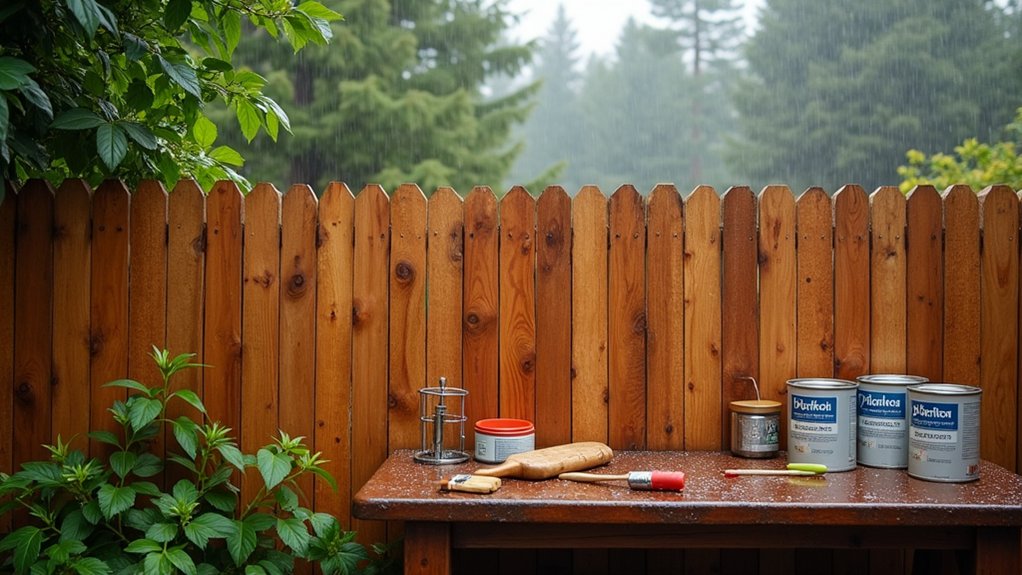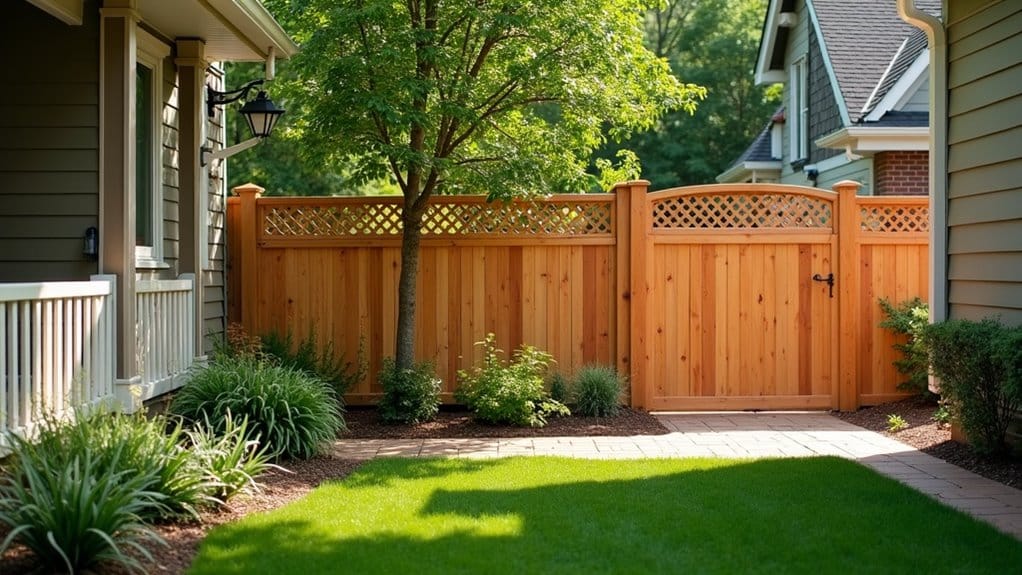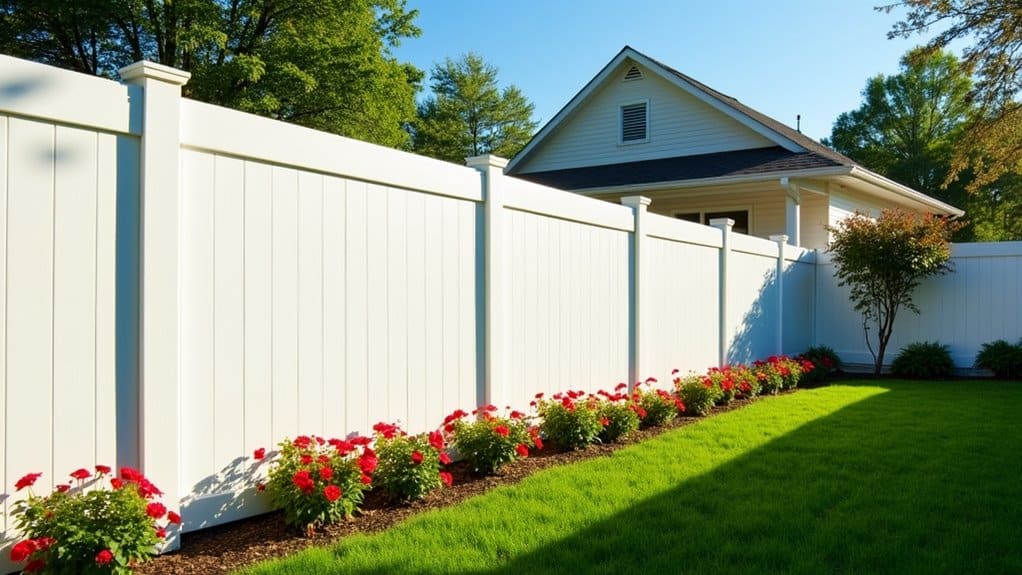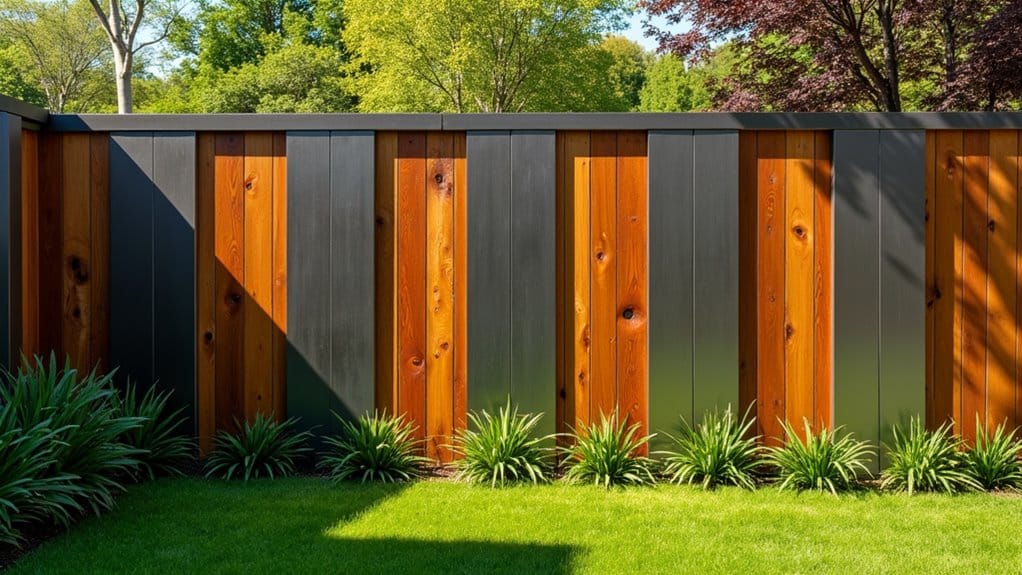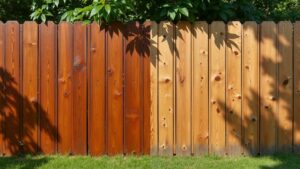To weatherproof your wooden fence effectively, choose between oil-based treatments for durability and moisture resistance, or eco-friendly water-based sealants for easy application. Paint offers strong coverage but requires careful prep work. Always clean and dry your fence before applying any product. Adding post caps can help prevent rot. For best results, learn about application techniques and maintenance tips to ensure your fence lasts longer.
Key Takeaways
- Oil-based treatments are highly durable and resist moisture well, minimizing the need for frequent touch-ups.
- Water-based sealants are environmentally friendly and soak into the wood, protecting it from moisture and UV damage.
- Paint-based protection not only shields your fence from the elements but also allows for color customization, with various shades and finishes available.
- Always start with proper surface preparation; ensure the fence is clean and dry for the best results.
- Applying multiple coats boosts protection and extends the life of your fence against harsh weather conditions.
Understanding Weatherproofing Treatments
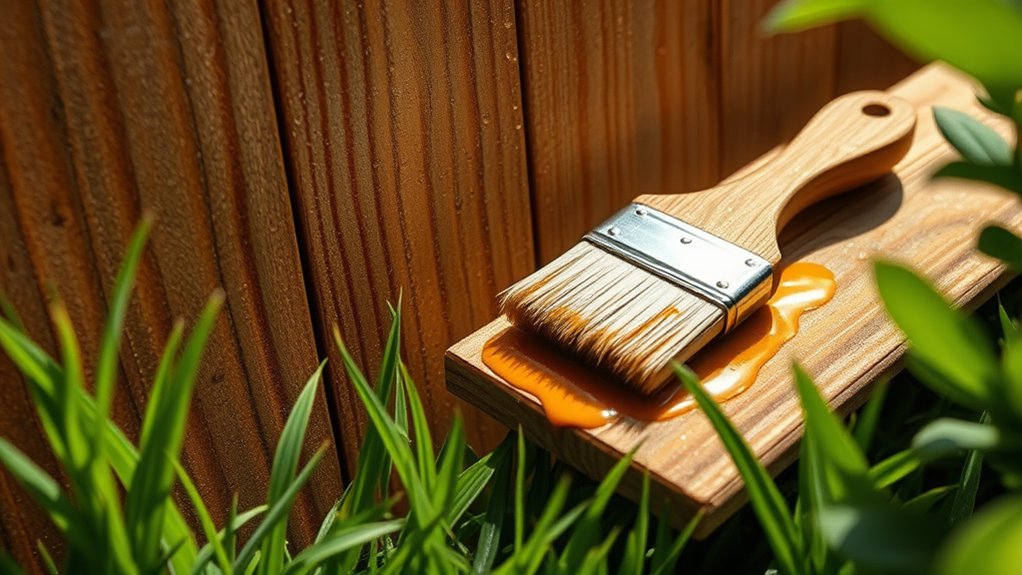
Weatherproofing treatments are essential for keeping wooden fences in good shape against weather damage. Key options include wood sealants, stains, and paints. Sealants provide a moisture barrier, stains soak into the wood for UV protection and a nice look, and paint offers strong coverage but needs careful prep and upkeep. The choice of wood species impacts the longevity and maintenance of the fence, making it crucial to select an appropriate material for your specific conditions. Before applying any treatment, it’s important to prepare the surface by sanding and cleaning it for better adhesion. You may need multiple coats for effective protection, and letting each coat dry fully will make it last longer. Regular maintenance, like reapplying every few years, helps keep your fence weatherproofed and looking great.
Benefits of Oil-Based Treatments
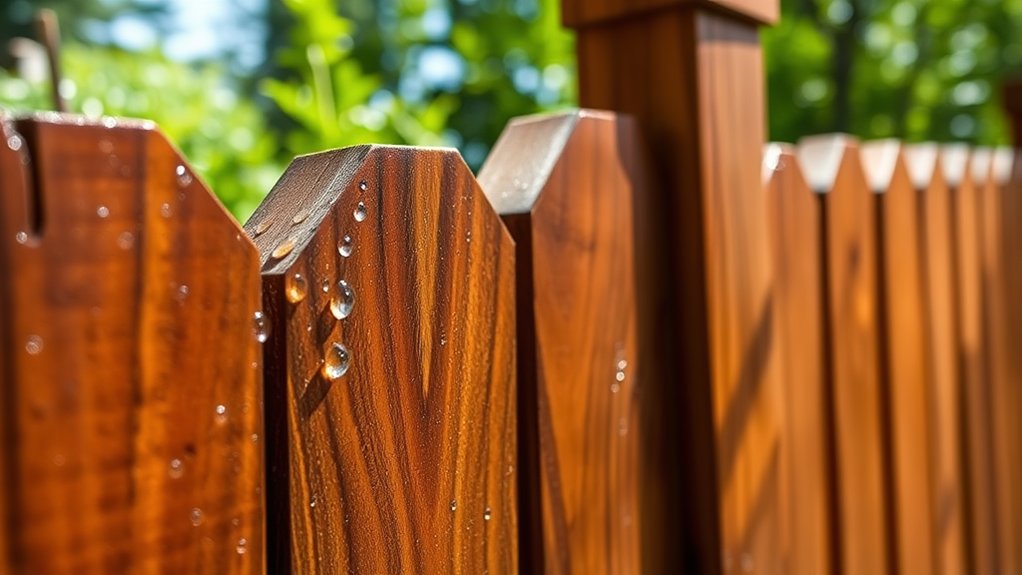
When protecting your wooden fence, oil-based treatments are a top choice because of their many advantages. They improve durability and create a water-resistant barrier, helping to prevent rot and mold. Plus, oil treatments last longer, keeping your fence looking good while shielding it from UV rays, making them essential for maintaining the integrity of fences and decking. Using quality materials, such as pressure treated wood, ensures your fence can withstand the elements for an extended period.
| Benefit | Description |
|---|---|
| Enhanced Durability | Strengthens wood fibers to avoid cracking. |
| Water Resistance | Blocks moisture from penetrating the wood. |
| UV Protection | Preserves color and structure in sunlight. |
| Easy Maintenance | Needs little upkeep without the hassle of stripping. |
In comparison to other options, oil-based treatments typically offer better longevity and effectiveness, ensuring your fence stays protected for years.
Advantages of Water-Based Sealants and Stains
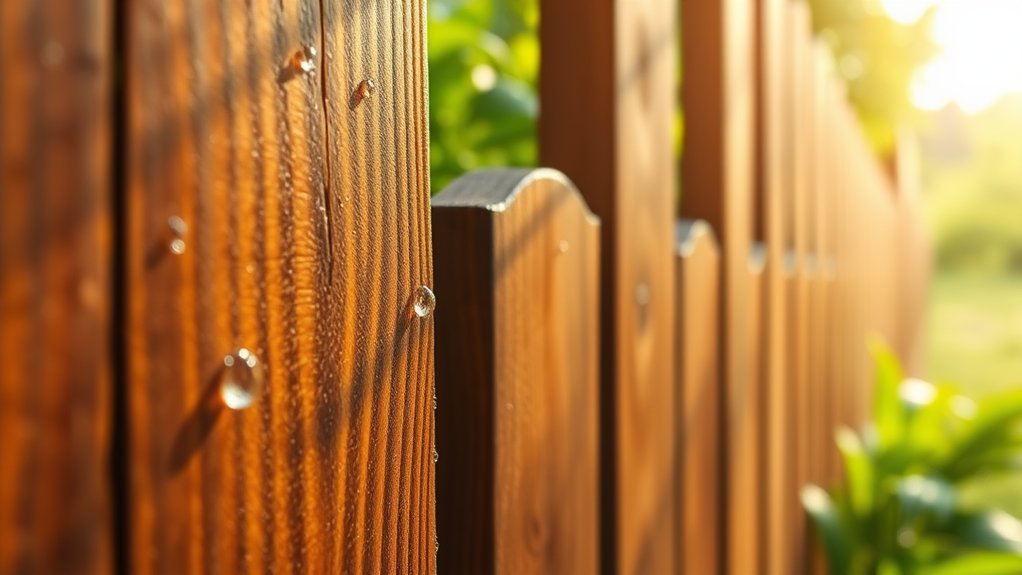
Choosing water-based sealants and stains is a smart, eco-friendly choice that protects your wooden fence without harming the environment. These products are great at resisting moisture, creating a strong barrier against rain and sun. They make fence maintenance easier and safer, all while being kind to the planet. Additionally, they offer better protection against moisture and elements, ensuring your fence remains in great condition for years to come.
Eco-Friendly Options Available
Choosing water-based sealants and stains for your wooden fence is a smart move. They boost durability and are eco-friendly, being non-toxic and low in VOCs, which helps reduce air pollution and health risks.
Plus, they’ve little to no odor, making them safe for kids and pets. Cleanup is simple—just use soap and water, which is better for the environment.
These products penetrate wood fibers, protecting against moisture, mold, and UV damage while keeping the wood’s natural look. They dry quickly and work well on dense wood, making application and upkeep easier. Additionally, considering the durability of PVC fences, which can last over 50 years, may also influence your choice when thinking about long-term investments in fencing.
Superior Moisture Resistance
Water-based sealants and stains are ideal for protecting wooden fences, especially in changing weather conditions. They form strong moisture barriers that penetrate wood fibers, preventing issues like swelling and rot. A big advantage is that you can apply these sealants even if the wood is somewhat wet, which speeds up your project when it’s rainy. They also cover imperfections well, improving the wood’s look while increasing durability against the elements.
| Feature | Water-Based Sealants | Oil-Based Sealants |
|---|---|---|
| Apply on Wet Wood | Yes (up to 25% moisture) | No (needs dry conditions) |
| Environmental Impact | Low VOCs, eco-friendly | Higher VOCs, harsher |
| Durability | Moderate, may crack | High, very resilient |
| Appearance | Uniform color | Glossy finish |
| Cleanup | Soap and water | Requires solvents |
The Role of Paint-Based Protection
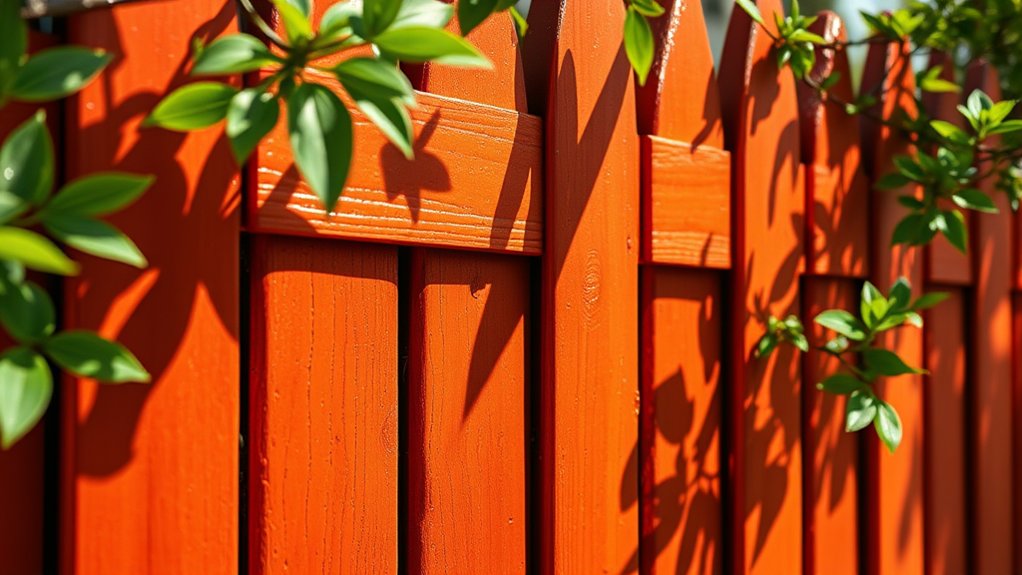
Choosing paint-based protection for your wooden fence does more than just keep moisture out; it creates a strong barrier against weather damage.
This durable coating not only extends the life of your fence but also allows you to pick from various colors to match your style.
Solid Barrier Benefits
When considering treatments for your wooden fence, paint-based protection is a strong choice against the elements.
Different types of paint offer various advantages. For instance, oil-based paints are durable and resist moisture and sunlight, while water-based options allow the wood to breathe, preventing damage.
Latex-based paints also breathe, helping to maintain structural integrity. Alkyd-based paints create a waterproof barrier, crucial for weather protection.
Additionally, weather-resistant paints with UV blockers and mildewcides help prevent fading and pest issues.
Aesthetic Customization Options
Aside from protecting your wooden fence, you can significantly enhance its look with aesthetic customization options.
Choose from a wide range of colors—like calming blues or vibrant greens—to set the mood in your yard. Textured finishes add character and can hide imperfections, making your fence stand out.
Whether you go for durable oil-based paints or quick-drying latex, the application method—brush or spray—will impact the final look.
Importance of Fence Post Caps
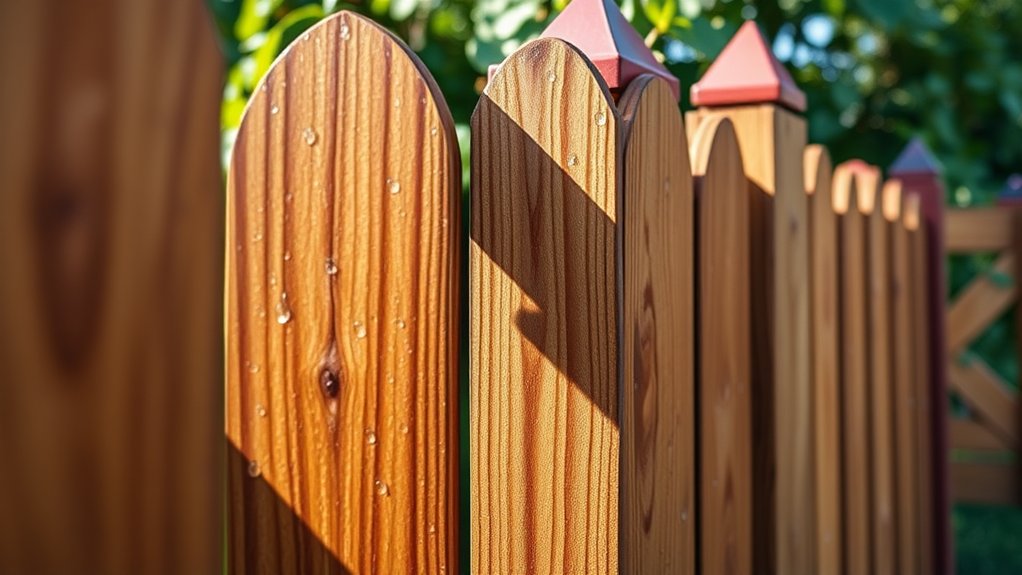
Fence post caps are often overlooked, but they’re crucial for protecting your wooden fence. They shield the exposed end grain from moisture, which helps prevent rot and structural damage.
You can choose from materials like vinyl, metal, or wood, allowing you to enhance both durability and style. Decorative options, such as rounded caps, not only add visual appeal but also reduce the risk of splinters.
Selecting the Right Wood for Fences
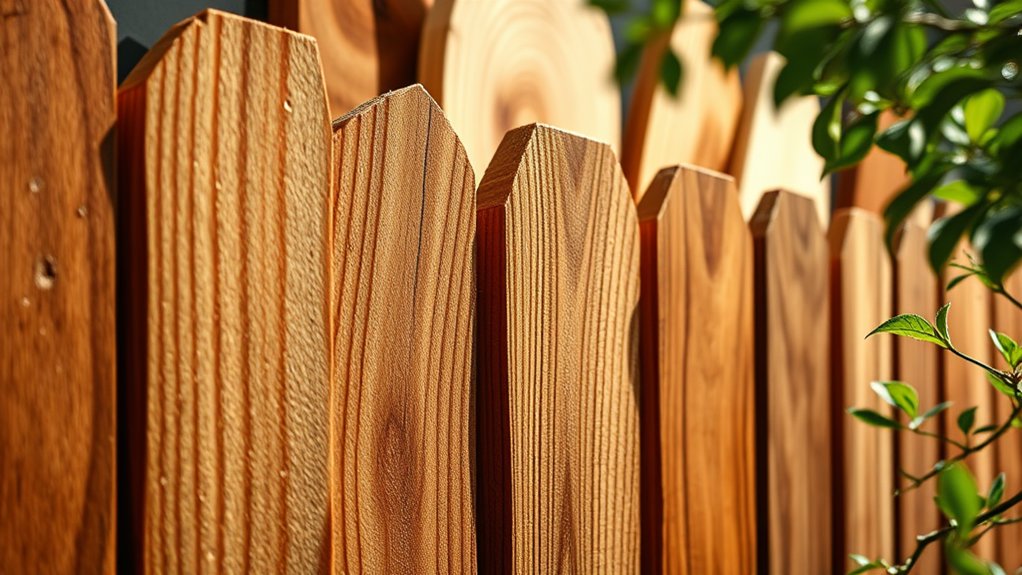
Choosing the right wood for your fence is crucial for its durability and appearance. Cedar and redwood are popular choices due to their natural decay resistance, making them great for long-lasting fences.
If you live in a humid area, cypress is an excellent option as it can last up to 30 years in moisture. For a budget-friendly choice, Southern Yellow Pine, especially when pressure-treated, provides strength without breaking the bank.
Consider your fence style too; cedar works well for modern designs, while rustic styles shine with the character of spruce. Your wood choice will significantly affect your fence’s performance and look. Additionally, opting for sustainably sourced wood ensures that your fencing choice is eco-friendly and supports responsible forestry practices.
Pre-Treatment Steps for Longevity
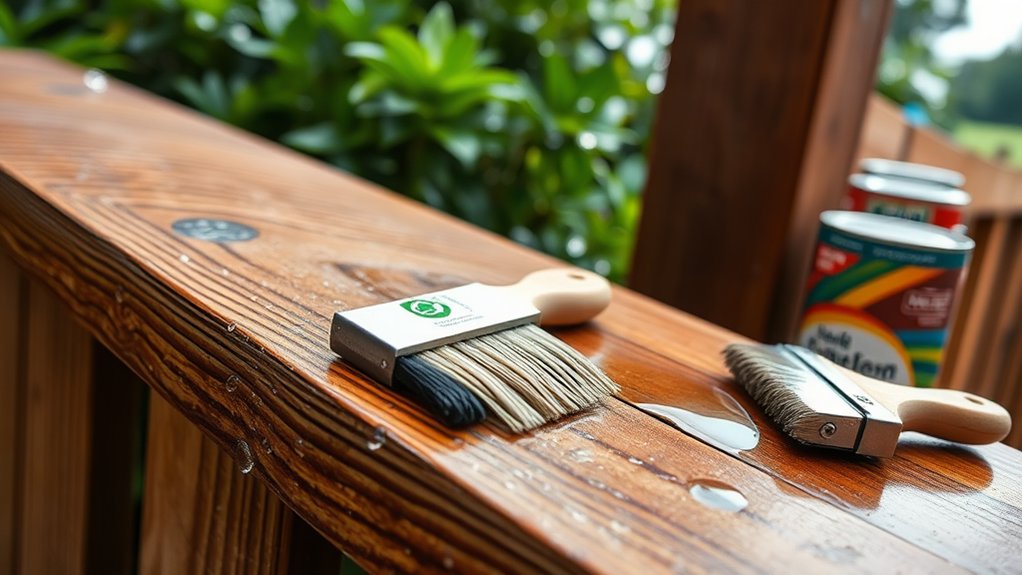
Before weatherproofing your wooden fence, focus on essential pre-treatment steps to boost its longevity.
Start by cleaning the surface thoroughly—remove dirt, mildew, and debris to prevent moisture buildup and wood rot. Use a garden hose for light cleaning or a low-pressure washer for tougher grime, being careful not to damage the wood.
For stubborn spots, scrub with a mild wood cleaner, then let the fence dry completely. Check for any damaged boards and replace them to keep the surface sound.
Only apply treatments during dry weather, avoiding rainy or humid days, as managing moisture levels is key to extending your fence’s life.
Application Techniques for Optimal Results
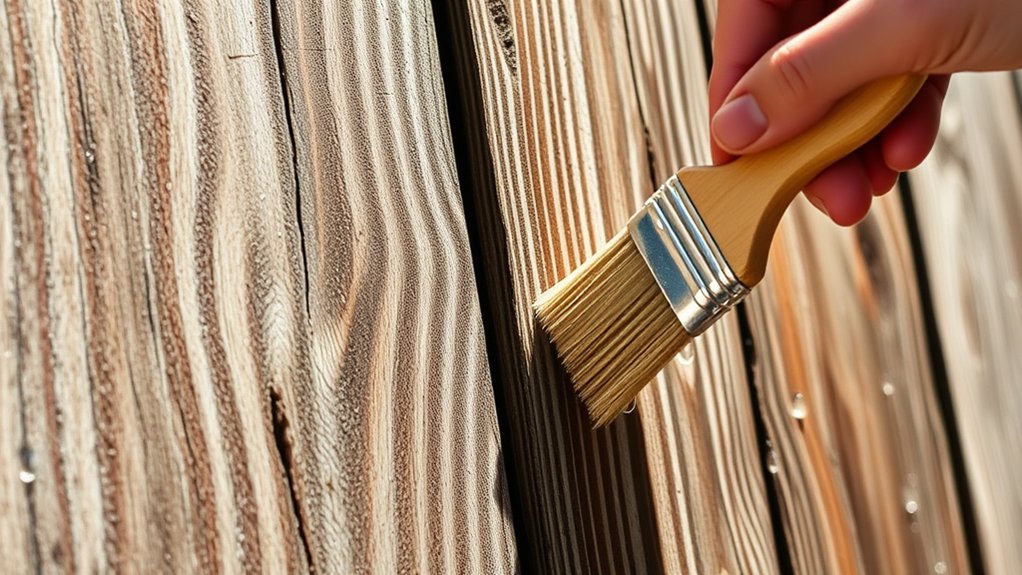
To get the best results when weatherproofing your wooden fence, choose the right application method. Sprayers work quickly and provide an even coat, perfect for larger areas.
If you need more control—like around plants or structures—use a brush to prevent overspray. Keep a steady distance and angle while spraying for even coverage, and pick a calm day to avoid wind issues.
Make sure to treat all parts of the fence, including edges and ends. Test a small area first to ensure you like the product.
Applying multiple coats can improve durability, so plan for that too.
Maintenance Tips for Weatherproofed Fences
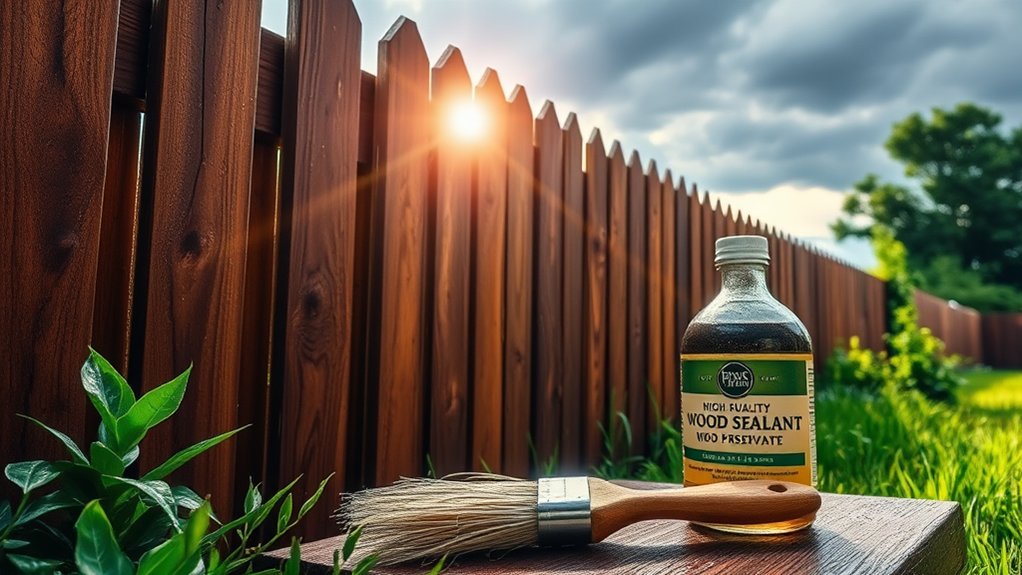
Weatherproofing your wooden fence is crucial, but maintaining that protection is key to its longevity and appearance. Here are some simple tips for effective maintenance:
| Task | Frequency |
|---|---|
| Inspect for damage | Twice a year |
| Clean the surface before reapplying | As needed |
| Reapply weatherproofing products | Every 2-3 years |
Check for issues like rot, mold, or loose hardware during inspections, and address them quickly. Keep the area around the fence clear of debris and plants to minimize moisture buildup. Following these steps will help keep your weatherproofed fence looking great for years.
Frequently Asked Questions
How Often Should I Inspect My Wooden Fence for Damage?
Inspect your wooden fence at least twice a year for damage. Regular checks help you catch issues early, which can save you from costly repairs and keep your fence looking good and standing strong.
Can I Use Multiple Treatments on the Same Fence?
Yes, you can use multiple treatments on the same fence to improve its durability. For example, combining a wood preservative with a sealant can provide better protection against moisture and pests. Just ensure the treatments are compatible and follow the application instructions closely for the best results.
What Tools Do I Need for Applying Treatments?
To apply treatments effectively, you’ll need a paint sprayer for fast coverage and a brush for detailed work. These tools ensure an even application, giving your wood surfaces a professional look.
How Can I Remove Old Treatments Before Reapplication?
To remove old treatments, use stripping solutions. Start by cleaning and sanding the fence for an even finish. Always prioritize safety when handling chemicals and tools.
Are There Any Safety Precautions When Applying These Treatments?
Always prioritize safety when applying treatments. Wear gloves and goggles, ensure good ventilation, and avoid windy days. Keep chemicals out of reach of children and follow the manufacturer’s instructions closely. Simple precautions can make a big difference!
Conclusion
Weatherproofing your wooden fence is essential for protecting it from the elements. Selecting the right treatments—like oil, water-based sealants, or paint—can significantly extend its lifespan and maintain its appearance. Proper preparation and application are crucial, ensuring your fence can withstand harsh weather. With regular maintenance, your fence will serve as a reliable barrier in your yard for many years.

